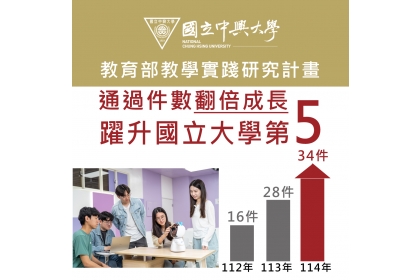Teaching Projects Doubled at NCHU within two years, Ranks 5th Among National Universities
2025-06-30
興新聞張貼者
Unit秘書室
922
National Chung Hsing University (NCHU) has received widespread recognition for its commitment to innovative teaching. The Ministry of Education recently announced the approved projects for the 2025 Academic Year’s Teaching Practice Research Program, with NCHU securing approval for 34 proposals—double the number from the previous two years. With a 63% approval rate, NCHU now ranks 5th among national universities.
Aligned with trends in technology and higher education, this year’s approved projects span a wide range of forward-looking topics, including AI-assisted teaching, sustainable development and university social responsibility, student-centered learning, EMI (English as a Medium of Instruction), and interdisciplinary education. The diversity and innovation of these themes highlight NCHU’s leading role in educational advancement.
Since the launch of the University Faculty Teaching Support System in 2017, the Ministry of Education has encouraged faculty to innovate in curriculum design, teaching materials, and educational technology through the Teaching Practice Research Program, aiming to enhance teaching quality and student learning outcomes.
Under President Fuh-Jyh Jan’s leadership, NCHU has promoted the philosophy of “Interdisciplinary Learning and Individual Talents,” with an emphasis on aligning teaching with global standards and bridging the gap between learning and application. The university has adopted a variety of measures to support faculty in advancing their teaching.
From a policy perspective, NCHU offers an additional NT$20,000 in funding to faculty whose proposals are approved by the Ministry, and uses project approval as a key criterion in recognizing outstanding teaching, such as in the selection of distinguished or specially appointed professors. Strategically, the university promotes educational innovation through a range of initiatives under the Higher Education Sprout Project, including problem-based, project-based, interdisciplinary, capstone, digital, and STEAM courses. In addition, NCHU fosters collaboration and knowledge-sharing through teaching innovation workshops, AI-integrated courses, faculty learning communities, and proposal-writing consultations.
Among the 34 approved projects this year, 11 focus on integrating AI into teaching, and 5 are linked to sustainable development and university social responsibility. The College of Management leads with 7 approved proposals, followed by the Colleges of Agriculture and Natural Resources, Liberal Arts, and Engineering with 6 each. The Colleges of Science, Law and Politics, Electrical Engineering and Computer Science, Medicine, and the General Education Center also received multiple approvals, demonstrating the university’s broad and active engagement in teaching innovation.
President Jan emphasized that NCHU’s commitment to the Higher Education Sprout Project and teaching innovation is centered on students. Through teaching practice projects, faculty are encouraged to reflect on and refine their course design. The doubling of approved proposals reflects a growing momentum among NCHU faculty to incorporate innovative teaching into their daily instruction. The university will continue strengthening its support system, integrating resources, and offering institutional incentives to further promote diverse and impactful teaching that not only deepens learning but also enhances its social relevance.
Aligned with trends in technology and higher education, this year’s approved projects span a wide range of forward-looking topics, including AI-assisted teaching, sustainable development and university social responsibility, student-centered learning, EMI (English as a Medium of Instruction), and interdisciplinary education. The diversity and innovation of these themes highlight NCHU’s leading role in educational advancement.
Since the launch of the University Faculty Teaching Support System in 2017, the Ministry of Education has encouraged faculty to innovate in curriculum design, teaching materials, and educational technology through the Teaching Practice Research Program, aiming to enhance teaching quality and student learning outcomes.
Under President Fuh-Jyh Jan’s leadership, NCHU has promoted the philosophy of “Interdisciplinary Learning and Individual Talents,” with an emphasis on aligning teaching with global standards and bridging the gap between learning and application. The university has adopted a variety of measures to support faculty in advancing their teaching.
From a policy perspective, NCHU offers an additional NT$20,000 in funding to faculty whose proposals are approved by the Ministry, and uses project approval as a key criterion in recognizing outstanding teaching, such as in the selection of distinguished or specially appointed professors. Strategically, the university promotes educational innovation through a range of initiatives under the Higher Education Sprout Project, including problem-based, project-based, interdisciplinary, capstone, digital, and STEAM courses. In addition, NCHU fosters collaboration and knowledge-sharing through teaching innovation workshops, AI-integrated courses, faculty learning communities, and proposal-writing consultations.
Among the 34 approved projects this year, 11 focus on integrating AI into teaching, and 5 are linked to sustainable development and university social responsibility. The College of Management leads with 7 approved proposals, followed by the Colleges of Agriculture and Natural Resources, Liberal Arts, and Engineering with 6 each. The Colleges of Science, Law and Politics, Electrical Engineering and Computer Science, Medicine, and the General Education Center also received multiple approvals, demonstrating the university’s broad and active engagement in teaching innovation.
President Jan emphasized that NCHU’s commitment to the Higher Education Sprout Project and teaching innovation is centered on students. Through teaching practice projects, faculty are encouraged to reflect on and refine their course design. The doubling of approved proposals reflects a growing momentum among NCHU faculty to incorporate innovative teaching into their daily instruction. The university will continue strengthening its support system, integrating resources, and offering institutional incentives to further promote diverse and impactful teaching that not only deepens learning but also enhances its social relevance.


